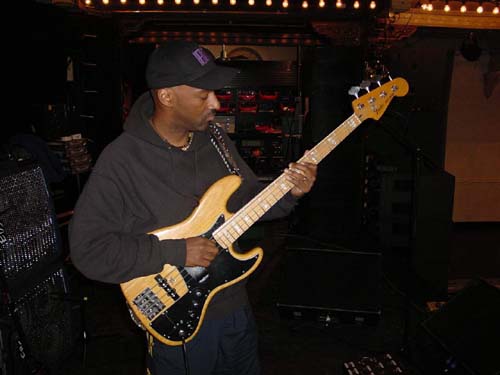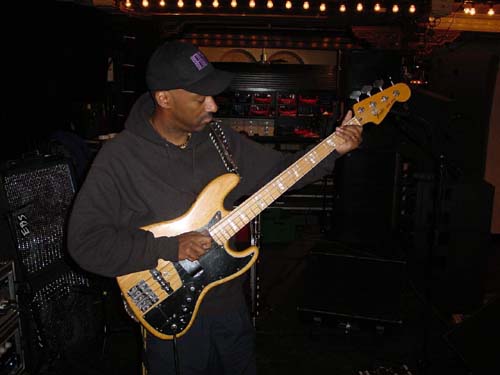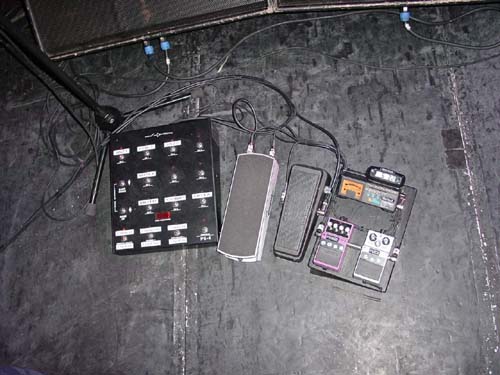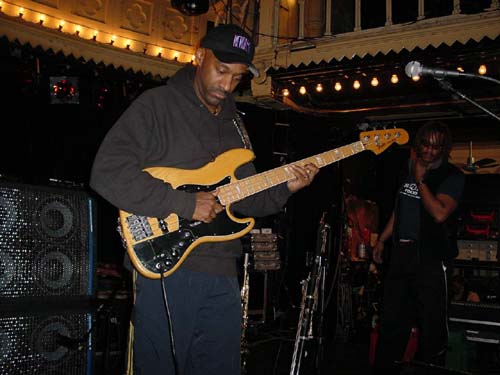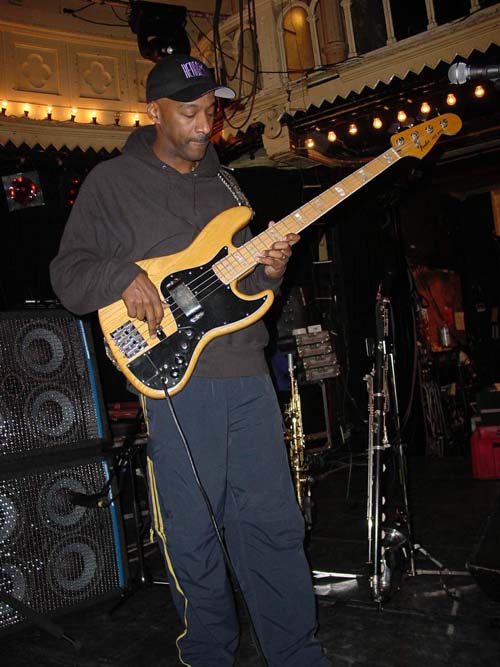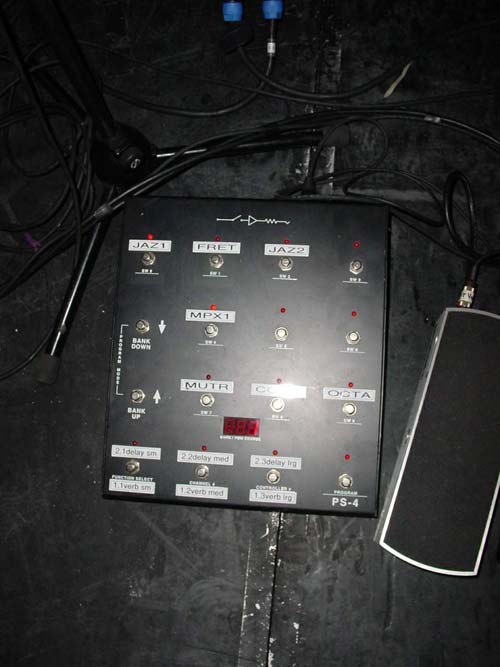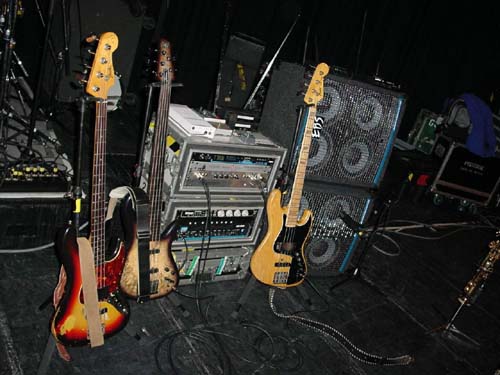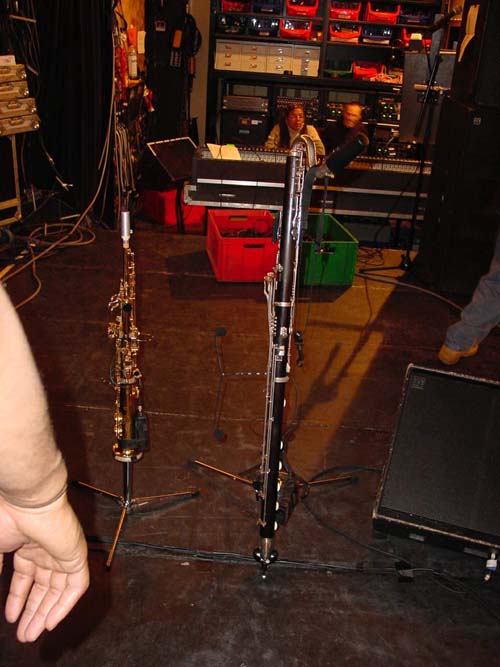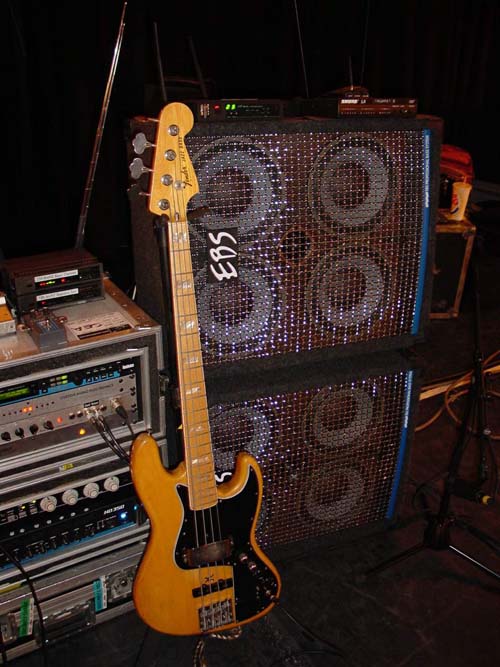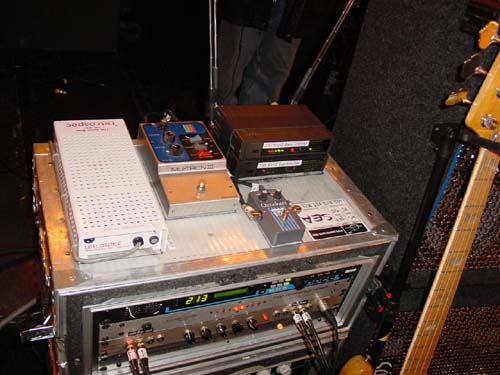My first interview for the new Dutch ‘Bass magazine’ was a cool one: Marcus Miller. He played paradiso Amsterdam with his band and I spoke to Marcus for 40 minutes in his dressing room.In this interview I tried to learn more about his songwriting and improvising.
A shorter version of this interview was published in the Bass Magazine 2002 may issue. Copyright Richard Hallebeek and Bass Magazine. Copying stricly prohibited. Photos copyright Richard Hallebeek. Don’t be a fool and use text and/or photos elsewhere without permission.
:: How’s the tour been so far?
‘Nice. Yeah man. We were in San Francisco, L.A., Seattle..
:: Where did you play in L.A.? Baked Potato?
‘No, we played at a place called ‘Cataline Bar & Grill’. Then we played Osaka, Tokyo, Frankfurt, Prague, Hamburg, Darmstad..’
:: Who’s your band for this tour? Dean Brown, guitar, Gerry Brown – drums..
‘Poogie Bell is playing drums. Different drummer. Roger Byam, saxophone..Leroy Taylor, keyboards and Patches Stewart.’
:: Do you have a vocalist or will you be doing any vocals?
‘Not that much singing this time. More instrumental stuff.’
:: There have been a lot of interviews about your bass playing and equipment and technique. I’d like to take a different view this time and focus on your songwriting, improvs, studio, etc. What do you use for songwriting? You use these AKAI MPC3000 sequencer, right? Can you tell me how a song develops and how you present it to the band? Do you bring charts or a tape?
‘The way it usually happens is, I get an idea and I put it in the MPC3000, the AKAI. Which is, you know, the basic stuff. And then, once I have it pretty close I’ll transfer it to my PARIS system which is a Pro Tools kind of a deal. And I’ll overdub some instruments and I’ll get it to sound pretty much like a complete record. As close as I can. Sometimes I’ll..then I’ll call other musicians and maybe some individual solo voices or something to come help me out. Sometimes I’ll do it that way. Other times I’ll just re-record the whole thing with a band depending on what the demo sounds like. So then once it’s done, time for us to go on the road.. I basically send the song to everybody and say ‘figure it out the best you can’ and when we get together I’ll show you how to play the different voicings that I prefer, you know. And then I’ll change it for live performance, so that it’s more appropriate for live guys. That’s usually the way it happens. Sometimes I’ll get an idea in my head and I just come to rehearsal and I just sit down at the piano and show the piano player his part and I’ll show the guitar player his part, you know. It happens a lot of different ways. But those are the main ways it’ll happen.’
:: When you start out writing a tune, is there a general point you find yourself starting from, like a groove, melody or harmony?
‘I got like 400 songs, or something like that and.. a lot of ’em come..if it’s a ‘song’ song, with a melody and harmonys it’ll come from the piano. If it’s more of a groove song it might come from the beat and the bass, you know. Depends on what the center of the song is. You start with whatever the center of the song is, a guitar part or a bass part or a beat or a melody. Depends on what the song is. And I think you gotta make sure that you don’t write songs the same way every time. Or else your songs will sound the same (laughs).’
:: Yeah, you wanna have some variation going.
‘Especially when you’ve written a few of ’em. You need to find different ways to come at it, so that..you’ll inspire yourself and give yourself different viewpoints, you know.’
:: When you played with Miles, did he make any suggestions for you compositions or did he help you out with your songwriting?
‘He would come and listen and say ‘man you need to write another section..it’s cool but I want another section’. Or, you know..’give me some contrary moving voices there’, really general things you know that would give you a little idea that you could start to explore, which was nice. Sometimes he would tell me specific things..’I don’t like the piano, take the piano out’, something like that. But really just general things to think about.’
:: You’ve writte quite a lot of stuff for movies. Does that involve a different way of working because you have to work with the actual images?
‘Yeah, you gotta work with the images, so you basically have to do whatever you can to support those images and more importantly, the emotions. That’s the main thing, that the music does.. is kinda directs the viewer emotionally so that you know what you should be feeling. Without music man, you’ll be amazed. You sit there with nothing. Music really, really kind of steers you to a lot of things. So that’s fun man, you know. The great thing is that I get to explore all those different colours. Because I have to use whatever colours I can find, how to get these emotions The not so hard thing is that the..focus is never really gonna be on the music. And if it is that means you probably didn’t do your job well. Because the focus should always be on the film. But there are always places where you can stick yourself in there and create something that might give the listener something fun to listen to for a minute.’
:: Yeah. I remember a lot of movies where I did not notice the music at all, but when you watch it a second time and pay more attention, you’ll notice how great it is because it actually does not interfere with the images or draws too much attention.
‘Exactly. What’s nice about if for me, also, is I discovered different things. Like, I just did a movie that took place in Texas, in the States. So I use a lot of Dobro and fiddle and slide guitar.’
:: Do you play that stuff yourself?
‘No, I’ve got some guys. I play some myself and I got some guys to do it. But I really got into the sound. And now I begun to start using those instruments in my own music. So it always opens me up and helps me to find new things.’
:: What’s that movie?
‘The movie’s called ‘Surfing Sarah’. It’s not released yet. It’ll probably come out in summer. But if you see it, see it twice so the second time you can listen to the music.(laughs)‘
:: I will make sure to do so! Any chance they will release the sound track for that movie?
‘Sometimes they do. They’re thinking about it. It’s, you know, a lot of decisions. Do we find an album where we just put a whole lot of hitsingers on it, or do we release the actual music from the movie, so they have to decide, whichever way is cool to me.’
:: Do you have any hints for players attempting to learn to play through chord changes in the style of music you play?
‘Well, what you gotta do is, there’s no easy way through it. You have to learn a lot of other people’s solos, you can’t just learn the solos, you have learn the chords, the harmony’s that are underneath those solos. So then once you’ve learned the solos then you have to figure out why they choose those notes against those harmony’s, you know. And once you do that a lot you begin to see things. And you begin to see how people think and then you can do it for yourself. Also, once you get good at it, then it’s just your imagination. You have to be able to just imagine things, you know.
:: Any good examples of solos you recommend checking out?
‘There’s a few of em..lets’ see.. there’s ‘Lonnie’s Lament’ on my last album and..’It’s Me Again’. On ‘The Sun Don’t Lie’ there’s a song called ‘Moon’ that a guy just gave me a transcription from, he wrote out all the notes. He didn’t get it all right, but that was pretty cool. (laughs)‘
:: Any stuff you studied?
‘Man, I studied so many things..I learned John Coltrane solos, I learned Paul Chambers solos, Red Garland, the piano player that used to play with Miles, I used to learn all his stuff..It’s important to learn as much as you can, to take in as much as you can, it gives you a lot of information.’
:: What’s your favorite John Coltrane period, the earlier years or the later, more spiritual stuff?
‘I like both. I like the earlier stuff like when he was with Miles, in the 50’s. I like the Giant Steps stuff, which is a little later. And then I like the stuff that he wrote right before he went really avant-garde. ‘Lonnie’s Lament’, ‘Crescent’,’Naima’, some beautiful things there.
:: ‘ Coltrane’s Jazz’ is one of my all time favorites.
‘Yeah, that’s a bad album, yeah man. But you know, I used to learn everything man, I’ll tell you, I used to learn funk solos from like Earth Wind & Fire, I learned the sax players solo. I learned Paul Chambers, I learned the Hubert Laws flute solos, Jaco Pastorius and Stanley Clarke, all the electric bass players, obviously I learned all that stuff.
:: Did you play those solos on a six string bass or would you transpose them to the bass register?
‘I play six string every once in a while. It’s nice. I kinda like the limitation of the four string, you have to imply a lot, you know. You have to.. you have to work a little harder. I’m thinking about using a five string with one extra string, high instead of low. But the problem is that the string sounds so thin, curly (laughs) you know what I mean? That C string? I gotta figure out a way man, ’cause I don’t like the sound of it. It sounds like a bad guitar, you know. So I have to maybe experiment with maybe some thicker gage or something like that, so it’s not so bad.’
:: Do you find new things in your technique or a recent breakthrough in any aspect of your playing?
‘Not recently. Recently I’ve just been trying to be more clear with my improvisation. You know, having an idea and presenting it clearly so that people can understand it, the first time. ‘Cause sometimes I’ll get very complicated right away and it’s just too much for people to deal with, you know. (laughs) I’m really working on just being clear and finding essential things to play.’
:: Do you tape your live shows to check your progress?
‘Yeah, but most of the time I don’t listen!’
:: I know, sometimes it’s too hard and to fresh to listen back right after a gig.
‘Yeah, I don’t feel like listenening after a gig. But.. I do have to and I do every once in a while. Just to see where I am, if I’m getting any clearer, any better.’
:: You have quite a CV in your production work. How did you develop your producing and engineering skills?
‘Well, I started off as a studio musician so I was in the studio all the time. I picked up a lot there. I was in people’s bands also, David Sanborn’s band, Roberta Flack, Luther Vandross and I’d write songs. Little home recording, four track stuff. And I’d present them with the songs, sometimes they’d say: ‘hey, I love the song, let’s record it’, so we’d go to the studio together. And I ended up living in the studio. Just experimenting with things, recording things, that was very good for me. Particularly with David Sanborn, he had a deal with a studio where the time was unlimited. So I just stayed there, I worked and I learned a lot that way. It was great, because I left Miles’ band in 1982, in order to get back in the studio. And then a couple of years later I got with Miles again, but this time as a producer and a songwriter so it was really good for me to take that time.’
:: Any producers whose sound you dig?
‘I like.. I don’t pay attention to producers on the Jazz tip. I do pay attention to producers on the R & B tip. I think Timberland is nuts. I love what he does and I love Teddy Riley, he’s a great producer and I have respect for him because he’s been around for a while now. He’s still doing quality stuff. So I like him. I like.. Eric Sermons on the hip hop side. That’s some cool stuff man..and that they’re doing in Philly with Jill Scott and those guys, I’m not really sure who the producer is, but I like that sound, too.’
:: I like the stuff Timberland did for Aaliyah.
‘Yeah man, he’s crazy. Inventive, too.’
:: In your studio you’re still using the PARIS hard disk recording system, right?
‘Using PARIS.. PARIS doesn’t have a sequencer, right.. It’s just audio. So it’s kinda like Pro Tools, you know, but with no sequencer at all. So, I’ve been experimenting with Logic because it has a sequencer and it has audio, too. Although now, the audio isn’t as good, it’s not as..sensible as PARIS. PARIS really makes a lot of sense to me. And it might be just because I’ve been working on it for so long. A lot of things in Paris are really easy, you have to take a couple of steps to do ’em in Logic, so..I’m just gonna spend some time with logic and see if it’s just me (laughs)‘
:: Do you feel the arrival of all those portable and affordable home recorders did something to the studio scene?
‘Oh, yeah man. Studios are dying. Unless you’re a big mix place, or you just have the best room in the city, for like orchestras and the live recordings, unless you have that, it must be tough man. Because not a lot of people need a big studio to record in, you know. It’s gotta be a big difference now.’
:: Do you rent out your own studio when you’re not working there yourself?
‘I rent it out. I try to keep it busy myself, but yes, we rent it out, especially to people we know. I don’t wanna make it like just a general commercial studio. But we defenitely let people in there.’
:: You’ve played on so many studio sessions. I’d like to hear about your best session and the worst situation you were in.
‘Oh man..I can’t remember any specific horrible scenarios. The only thing would be like when the producer doesn’t know when we have a good take. Those are always like the worst things.’
:: You have to tell him which take to use?
‘Well, you know, he’d just keep you there all day. Just doing take after take not really knowing what he’s looking for. And you go:’man, we had it about two hours ago’, you know what I mean? And that was always though. As I got to be more respected I just tell the producer, ‘hey man, that was the one, check it out’, and help the guy, you know. After a while you realize if you’re a musician, you’re doing a session, your job isn’t just sit there like a robot, you know. You should help the guy if you can. So I began to do that and that made it a lot easier. And the nicest moments man, where just when�you know, we’re doing session after session, especially back then, three or four a day. But every once in a while, everything would be right. You’d do a session and it would stick out. Although you’ve done hundreds of ’em, for some reason everybody would be on the same wavelenght. Like Luther Vandross, there’s a couple of Luther Vandross records that are just beautiful. And Luther did ’em live, he sang with us and we played. Superstar, you know what I mean, listen to that man, everything was beautiful that day. There’s some moments like that, that were nice man and you never forget. You never know when they’re gonna happen either, you know.’
:: Your new album ‘M2’ has some nice covers on there, but you defenitely manage to put your own stamp on there.
‘When you listen to the originals and then you hear mine, you say, OK, I see how he thinks, right? He changed this, he put a beat to that, I see what goes through his crazy mind. (laughs) And I think that’s why I do the covers, ’cause you kind of have a better idea what I’m all about.’
:: I dug your original ‘It’s Me Again’. That had some Pat Metheny overtones.
‘You know man, that’s funny you say that. I wanted Pat to play on that!
:: Really? He would definitely fit in there.
‘Yeah. He was just in the middle of the album that just got released now. (that’s ‘Speaking Of Now’) But man, you’re the first one who ever said that. Because it was for him. The Brazilian kind of sound..you know, he wrote me long letter ‘sorry man, I’m just doing all this crazy stuff’, I said ‘no problem’. But I though he would have been really nice on it.’
:: Let me mention some names, I would like to hear your reaction. Allan Holdsworth.
‘Oh man, that boy is crazy, man. He played on one song for me that I wrote for Boz Scaggs. It was called ‘Funny’. But it was just to out there for Boz and his producer, you know what I mean. But what he played there was crazy. And then, he tried to get me on his album once. But I was just running crazy, I was probably over here at that time, so it never worked out. But I do respect his playing.’
:: Was that a long time ago?
‘It was about 5 years ago’
:: Scott Henderson.
‘ Who’s that, I don’t know that.
:: Scott Henderon, the guitar player. Not the magician. From Tribal Tech?
‘With Tribal Tech, Oh, I know the group I didn’t know that was the guitar player. Yeah, I like that group, man. Is that his name, Scott Henderson?
:: Composer and player, yes.
‘Who’s the bass player?’
:: Gary Willis.
‘Right. That’s who I know. But I like them, man. I like them a lot.
:: You guys should get together. The funky vibes would fit. Scott did this album with Victor Wooten and Steve Smith, ‘Vital Tech Tones’, out on the Tone Center label.
‘Was it good?’
:: A lot of improv’d stuff that’s a little to much for my taste at one point, but the guys are monster players.
‘Yeah, makes you wanna skip to the next tune, I see what you’re saying, yeah. I’d like to check that out.’
:: Billy Sheehan .
‘He’s bad, man. He’s bad, I mean, I’ve only heard him in like, the big, big situations. But I’d enjoy watching him play. (laughs) And I’d try to learn some things from him, some of that tapping stuff, it’s fun man.’
:: Did you check out ‘Vertu’ with Stanley Clarke?
‘That’s not new, right?
:: Few years ago.
‘The one with Lenny White and the violinist?
:: Yeah.
‘It’s kind of..reminiscing, you know what I mean. It’s kinda like the old days, the old fusion days, but I did enjoy it. Lenny played it for me, I enjoyed listening to it. I love Stanley Clarke, you know.
:: How much of the material on your new album is actually played together? Was there a lot of overdubbing involved?
‘Burning Down The House’, ‘Amazing Grace’, ‘Red Baron’, ‘Lonnie’s Lament’ are live performances. Maybe a couple more. Live in the studio. And then overdubs, you know. And then a couple of ’em I put together. Like ‘Boomerang’..what else did I put together.. ‘Ozell’ they’re just like studio works. But the body of the album, we’d just come of the road, went into the studio, record it. And then I’d add things I’d add a little strings, different things to it, but it’s primarely live. And ‘Power’ was in the studio, the first song on the album, that was studio.’
:: ‘Goodbye Pork Pie Hat’ is your first-time recording with Herbie Hancock. How was that?
‘Fantastic man! ‘Cause you know, people would ask me ‘man, you play with everybody, who would you like to play with now?’ and my answer was like ‘nobody, I’m done with that’ you know what I mean, with dreaming about playing with other people. Now I want to get to the point, I want to get good enough so people want to play with me, you know what I mean, that’s what I’m trying to get to. But Herbie, I gotta admit it was nice, ’cause I had never really recorded with him before, it was really nice. Especially since it was my record, you know. And the first two bars..of his solo..I was like, how’s he gonna find his way home? He did it man, like the most natural thing in the world. You know it was really funny, it’s like when you hear Herbie Hancock play, you know what my first reaction is? Well, here’s another guy playing like Herbie (laughter) Right? And then you go..wait..this IS herbie! It’s incredible, man.’
:: The album is released on your own label, called ‘Three Deuces’.
‘Thee Deuces was an old club on the b bop strip in New York, right. There was 52 Street , Birdland and Three Deuces. We put it together so that we could release my kinda music, like funky jazz. Not smooth jazz and not..more like traditional jazz.
:: Did you have trouble before that, getting your own music out?
‘Never had problems getting it out. But what I did have is a.. sometimes they were a little confused as how to promote it. Because it was in between things, you know. So, now with the label, we’re not distributing the album ourselves. But we do do it ourselve and then we hand it to a record company who we think understands it the best. And that gives us a little more control, so that’s nice.
:: Any plans getting ‘Legends’ back together with Eric Clapton, Steve Gadd, Dave Sanborn and Joe Sample?
‘I would like to complete an album of things that we started back in ’97. Get the guys back together maybe to cut a couple of more songs. It would be nice. It depends..superstar bands are hard because everybody’s got their own life, their own path, you know. But I did have a good time with that group.’
:: Wayne Shorter’s ‘Highlife’ is one of my favorite albums that you produced and played on. Do you remember anything about those sessions?
‘Man, yeah..hell, yeah (laughs) I remember going to Wayne’s house and he’d have a composition, man..twelve pages. Right? And I go, Wayne..OK, that’s enough, you know, this thing is complete. Don’t touch it. OK, and I’d go home, come back the next day, I just want a little bridge and the bridge would be six more pages, you know. And I realized that Wayne Shorter has such a fountain of ideas, that what Miles did and what Zawinul did was, they edited. I said, Wayne, we’re just gonna use page three, you know what I mean, that’s all we need, just page three! And, I thought about it and say you know what would be nice? Is for people to be able to hear exactly what Wayne hears. Instead of just page 3. I want them to hear page one through 17, you know? And sure enough, my music stand..when I played the charts, I had maybe five or six music stands ’cause the paper just went all the way across. And it was a lot for people to digest. But everybody who has the album, says I listened to it and every time I listen to it, I get something else, you know. I think as time goes by, the albums gonna be a very special album for me. There’s a lot of stuff happening there.’
:: You’ve had very succesful carreer as a studio cat, live player and composer. How do you think somebody’s geographical environment plays a role in how you sound and how you develop as a musician?
‘People play like their environment. And being in New York, where just everything happens, funk, jazz, salsa, reggae, African music, all at the same time. And since I was so hungry I learned all that stuff and tried to really feel all those kinds of music. Calypso music, you know since a lot of my family is from the west indies..so for me it wasn’t that hard going back and forth and I think it might have been a little harder if I was someplace else where there’s one distinct style.
:: You’ve met a lot of cats there, too in NY.
‘Yeah and at a young age. You gotta do it young. Like, when you’re 23 man, it’s too late to start taking in influences. You can get light stuff up at the top of what you do, but the influence at the bottom, you have to hear that stuff right when you begin, 13, 14, 15 years old. Those years are really important in terms of what you feel, you know. So..I was lucky to be exposed to a lot of music then, that’s really important. That was always also my problem. Eventually trying to find my way in terms of my artistry. Who am I, you know. If I come from New Orleans, it’s very easy, I play this, you know. If I come from the bay area, or from Texas, you will play a certain way. But for me I had a lot of different choices and it took me a little while to find myself.’
:: Your Future plans?
‘Finish a Take 6 album I produce, that I like, that’s really nice. And doing some movie stuff, gonna start another record soon. Like to get an album out on my trumpet player Patches. So, just trying to stay busy. And get better.’
:: Copyright Richard Hallebeek and Music Maker magazine 2001 ::
